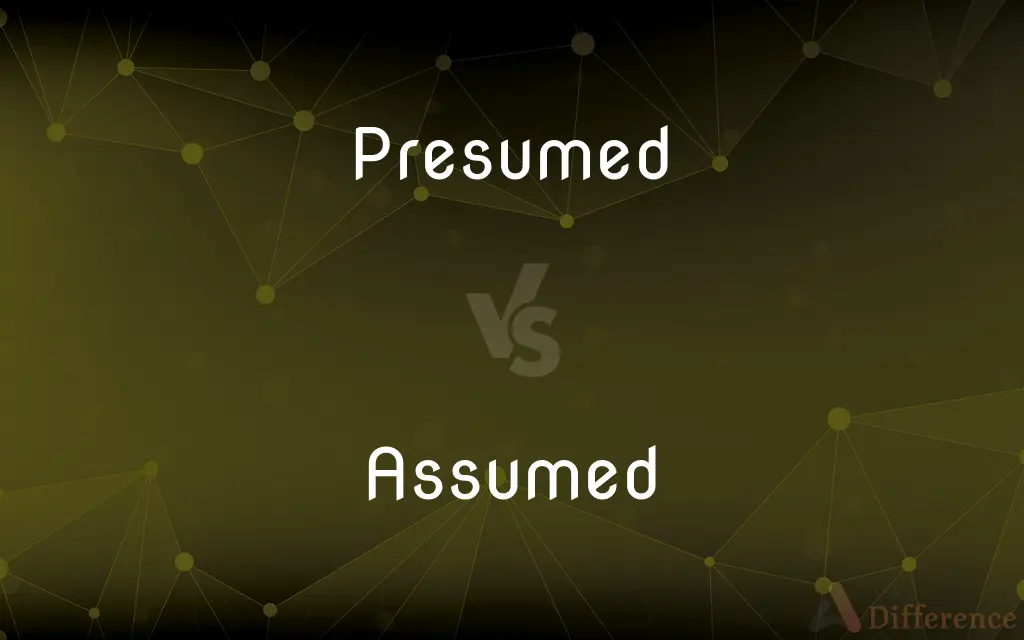Presumed vs. Assumed — What's the Difference?
Edited by Tayyaba Rehman — By Urooj Arif — Updated on March 21, 2024
Presumed involves beliefs based on probable evidence, while assumed relates to accepting something as true without proof.

Difference Between Presumed and Assumed
Table of Contents
ADVERTISEMENT
Key Differences
Presuming often implies a level of reasoning or evidence leading to a belief, suggesting that while not confirmed, there's a basis for the presumption. On the other hand, assuming typically involves taking something for granted without the need for evidence, often based purely on conjecture or to simplify further reasoning.
While presumption may carry a connotation of caution or provisional acceptance pending further information, assumption tends to suggest a more definitive stance, albeit one not necessarily backed by facts. This subtle difference underscores the degree of certainty or willingness to question the belief in question.
In legal contexts, presumed innocence indicates a legal right based on the principle that one is considered innocent until proven guilty, underscoring the requirement of substantial evidence for change. Conversely, an assumption in such settings might relate to an unverified belief that doesn’t necessarily affect legal standing or outcomes, demonstrating how the context can affect the interpretation and consequences of these concepts.
Presumptions often require a trigger or a basis, such as an event or a piece of evidence that leads to the presumption. For example, if someone's car is not in their usual parking spot, one might presume they are out. Assumptions may not need such a trigger; one might simply assume someone is always busy without specific evidence or patterns to support that belief.
The way in which presumed and assumed are used in communication also highlights their differences. When someone says they "presume" something, it often invites further inquiry or confirmation, signaling openness to correction. Saying "I assume" might close off such dialogue, implying a firmer stance that might not be as easily swayed by additional information.
ADVERTISEMENT
Comparison Chart
Definition
Belief based on probable evidence or reasoning.
Accepting something as true without proof or evidence.
Connotation
Implies a degree of caution, open to change upon further information.
Suggests a more definitive stance, often without requiring evidence.
Context
Often used where there's some evidence or likelihood, though not confirmed.
Used in contexts where evidence is lacking or when simplifying arguments or reasoning.
Legal Usage
Associated with rights or principles that assume a condition is true until proven otherwise.
May not have a direct legal implication but implies a belief taken as true for argument’s sake.
Communication
Suggests openness to further discussion or correction.
May indicate a more closed stance, less open to revision based on new information.
Compare with Definitions
Presumed
Legal Principle.
In court, the defendant is presumed innocent until proven guilty.
Assumed
Lack of Evidence.
He assumed she wouldn't attend without actually asking her.
Presumed
Provisional Belief.
Given the cloudy skies, he presumed it would rain later.
Assumed
Simplification in Arguments.
For the sake of argument, it's assumed that all swans are white.
Presumed
Based on Evidence.
She presumed the meeting was canceled due to the empty conference room.
Assumed
General Beliefs.
It's often assumed that celebrities have no privacy concerns.
Presumed
Open to Change.
They presumed the project was on schedule, pending the latest update.
Assumed
Firmer Stance.
She assumed responsibility for the error, though it was not solely hers.
Presumed
Triggered by Context.
Seeing the lights off, she presumed everyone had left.
Assumed
Conjecture.
They assumed the traffic would be bad, despite no prior reports.
Presumed
To take for granted as being true in the absence of proof to the contrary
"I presume you're tired after the long ride" (Edith Wharton).
Assumed
Taken up or used so as to deceive; pretended
An assumed name.
Presumed
To constitute reasonable evidence for assuming; appear to prove
A signed hotel bill presumes occupancy of a room.
Assumed
Taken for granted; supposed
An assumed increase in population.
Presumed
To venture without authority or permission; dare
He presumed to invite himself to dinner.
Assumed
Simple past tense and past participle of assume
Presumed
To take for granted that something is true or factual; make a supposition.
Assumed
Used in a manner intended to deceive; pretended; simulated.
Presumed
To act presumptuously or take unwarranted advantage of something
Don't presume on their hospitality.
Assumed
Supposed or presumed.
Presumed
Simple past tense and past participle of presume
Assumed
Supposed.
Presumed
Appearing to be the most probable, often with some preparations starting to be made for it.
Assumed
Pretended; hypocritical; make-believe; as, an assumed character.
Presumed
Presumed to be true in the absence of proof to the contrary;
The presumed reason for his anger
Assumed
Accepted as real or true without proof;
An assumed increase in population
The assumed reason for his absence
Assumptive beliefs
His loyalty was taken for granted
Assumed
Taken as your right without justification;
Was hearing evidence in an assumed capacity
Congress's arrogated powers over domains hitherto belonging to the states
Assumed
Adopted in order to deceive;
An assumed name
An assumed cheerfulness
A fictitious address
Fictive sympathy
A pretended interest
A put-on childish voice
Sham modesty
Common Curiosities
Why is it important to distinguish between presumed and assumed?
Distinguishing between them is important for clear communication, especially in contexts where evidence, certainty, and openness to new information are relevant.
What does it mean to assume something?
To assume means to accept something as true without proof or evidence, often based on personal belief.
Can presumed and assumed be used interchangeably?
While they can be used in similar contexts, the choice between them can convey different levels of certainty and evidence.
Can a presumption be wrong?
Yes, a presumption can be wrong, as it is a belief based on probable evidence that has not been confirmed.
What does it mean to presume something?
To presume means to believe something based on probable evidence or reasoning, though not confirmed.
Does presumed always imply evidence?
Presumed generally suggests there is probable evidence or reasoning behind the belief, though it might not be direct or confirmed.
How do legal contexts distinguish between presumed and assumed?
In legal contexts, presumed involves rights or principles based on an assumed condition true until proven otherwise, while assumed beliefs might not directly affect legal outcomes.
Is there a difference between presuming and assuming?
Yes, presuming often relies on some form of reasoning or evidence, while assuming does not require evidence and is more conclusive.
What role does presumption play in critical thinking?
Presumption, when based on reasoning and evidence, plays a key role in critical thinking by allowing provisional conclusions that are open to revision.
Why might someone prefer to use "assume" over "presume" in a conversation?
Someone might use "assume" to express a firmer stance or belief, potentially to simplify a conversation or argument without delving into specifics or evidence.
Can an assumption turn into a presumption?
Yes, if additional evidence or reasoning supports an initial assumption, it might shift to being a presumption.
Is assuming always without basis?
Assuming often lacks a firm evidence basis, but it may be based on personal experience, stereotypes, or simplifications for the sake of argument.
What's an example of a situation where it's better to presume than assume?
When there is some evidence or indication leading toward a conclusion, it's more accurate to say "presume," indicating openness to further information.
How does culture influence what we presume or assume?
Cultural norms and experiences can shape what individuals are more likely to presume or assume, affecting perceptions and judgments.
Can the misuse of assumed and presumed lead to misunderstandings?
Yes, misusing these terms can lead to misunderstandings, especially if one conveys certainty or evidence inaccurately.
Share Your Discovery

Previous Comparison
Risk vs. Variance
Next Comparison
Balcony vs. WalkwayAuthor Spotlight
Written by
Urooj ArifUrooj is a skilled content writer at Ask Difference, known for her exceptional ability to simplify complex topics into engaging and informative content. With a passion for research and a flair for clear, concise writing, she consistently delivers articles that resonate with our diverse audience.
Edited by
Tayyaba RehmanTayyaba Rehman is a distinguished writer, currently serving as a primary contributor to askdifference.com. As a researcher in semantics and etymology, Tayyaba's passion for the complexity of languages and their distinctions has found a perfect home on the platform. Tayyaba delves into the intricacies of language, distinguishing between commonly confused words and phrases, thereby providing clarity for readers worldwide.















































